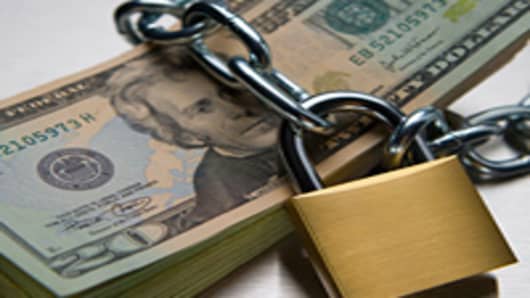Cash rules!
Burned in the past decade by the dot-com bubble, Enron-style corporate governance, the housing bubble, the credit crunch and the Great Recession, retail investors have their money in places with little or no return but virtually no chance of a loss.
Estimates suggest that 130 million U.S. households have as much as $9 trillion sitting in savings accounts, certificates of deposit, Treasury bills and money market funds. All that cash may be earning next to nothing—CD rates are now well below 2 percent—but it’s a far sight better than losing 40 percent of their equity portfolio's value, as many did in 2008.
“I think most retail investors think the market is a sham,” says Michael Bechara, managing director of Granite Consulting Group in Brewster, N.Y. “The less sophisticated arrive at this conclusion via intuition. The more sophisticated realize that a handful of major players are passing shares back and forth rapidly.”
Money flows appear to bear that out.
In 2009, almost 60 percent of the $1.2 trillion net flows into long-term funds were bond funds, according to The Investment Company Institute.
More recently, following the peak of the year-long rally in stocks stock funds were posting net outflows while bond funds registered large inflows.
Stock funds posted outflows of $5.41 billion in June and $24.76 billion in May, following the April peak. During the same periods, Bond and taxable bond funds had combined net inflows of $39,53 billion and $26.42 billion, respectively..
In the most recent week, as US stocks capped an 8-percent gain in July, equity funds had outflows of $3.85 billion, while the two bond categories had inflows of $13.25 billion.
“The small investors have largely sat out the [stocks] rally out and with good reason as the market has made a firm departure from fundamentals,” adds Bechara.
“It’s understandable that investors are gun shy of investment markets after one of the worst decades in history,” says Denver-based wealth manager Mark Brown. “However, it would seem to me, that the next ten years will likely be more productive than the last ten. It is difficult to find a time in history where there have been two decades in a row of lousy stock market performance.”
Nevertheless, with so many investors on the sideline, there's growing debate about whether many of them will ever return.
Opinions are mixed as to whether the financial reform bill signed by President Obama in late July will be enough to lure individual investors back to the stock market. The law subjects more finance companies to federal oversight and regulates many derivative contracts and other shadow financial markets that contributed to the current recession.
At the signing ceremony, Obama said, "We all stand to gain from these reforms. We all win when investors around the world have confidence in our markets. We all win when shareholders have more power and information."
It will take many months for the reforms to take hold, and most observers see little positive impact until perhaps 2012.
“The financial reform bill is supposed to engender more trust, although we'll certainly have to wait and see how effective it is,” says David Lo, director of investment services for J.D. Power and Associates. “More stability in the market will likely be more effective to engender trust, particularly in the short-term.”
Brown disagrees. “I do not think the financial reform bill will lure investors back,” he said. “Everyday investors are as cynical about Washington as they are about Wall Street. The individual investor, as a large group, usually is on the wrong side of the trade. Once the market is up consistently is when they typically get in, which is usually the wrong time.”
"People are tired of bubbles—the dot-com bubble, the housing bubble. Now, when they see the market take off, they don’t buy in."
Bechara, whose firm specializes in corporate governance and risk assessment, says he spends much of his time with CFOs worried about the wane of individual investors.
“People are tired of bubbles—the dot-com bubble, the housing bubble,” he says “Now, when they see the market take off, they don’t buy in. Maybe this is a good time to adopt preservation of capital as an investment strategy. "
Lo thinks a lot of the idle cash out there belongs to aging baby boomers. “The time horizon for these people is shorter and many may be taking a more conservative approach,” he says.
Other market watchers take a darker view, especially after the excesses of the financial crisis, wherein Wall Street quickly rose from the ashes while Main Street continued to sink and smolder.
Bearish market blogger Charles Hugh Smith thinks says small investors beware “The stock market isn't about building middle-class wealth, and the middle class seems to have finally figured that out,” Smith mused in a recent post. “The equity market is all about concentrating wealth."
The lost decade for stocks has been accompanied by flat wages for many and unemployment for some, so the average retail investor is feeling poorer anyway.
Hard times breed caution and cynicism, which make risk unappealing. Like the economy right now, the stock market looks fragile, so investors are unwilling to walk on thin ice. As the economy improves, so may the psyche of the retail investor.
“It probably is cyclical,” says Bechara. “I don’t think retail investors will stay out forever, but they are looking for price equilibrium. They don’t trust the pricing of the market right now. The valuations will have to be more believable for their money to flow back into the market.”


